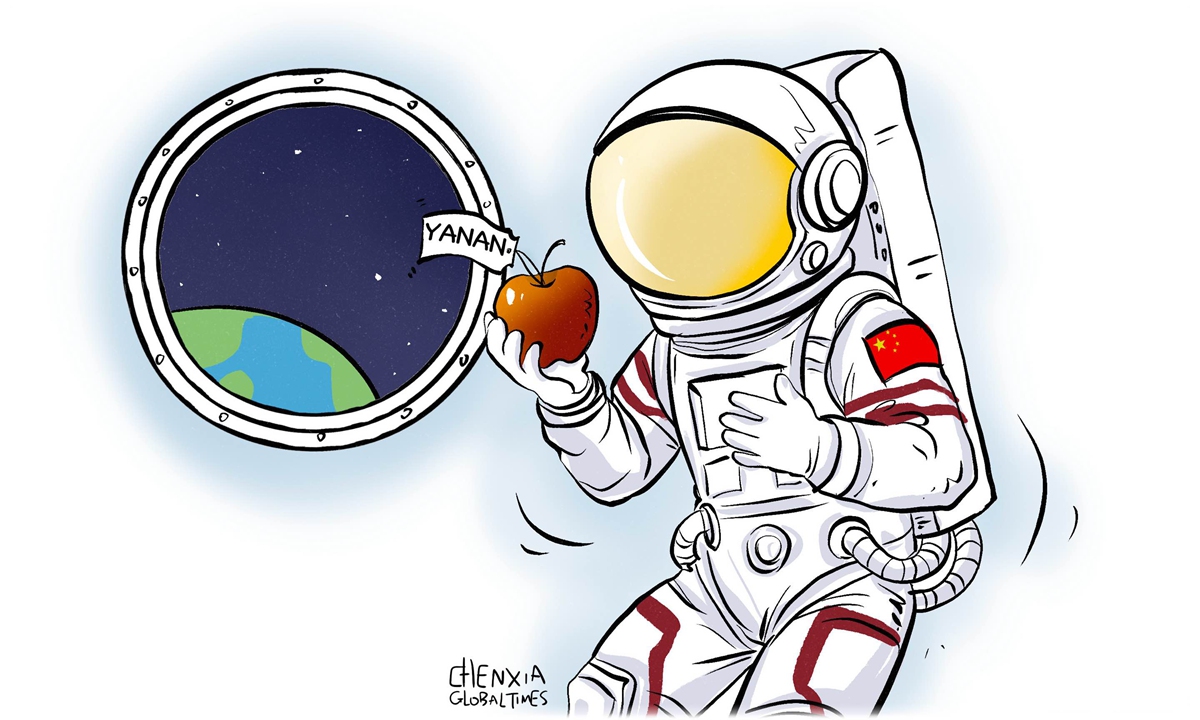Commentaries
Your Present Location: Teacher_Home> Ding Gang> CommentariesBehind Yan’an apples in space is a story of grit
Behind Yan’an apples in space is a story of grit
Source: Global TImes
By Ding Gang
Update: Nov 20th, 2025, 9:32PM

Illustration: Chen Xia/GT
When Chinese astronauts bit into a fresh apple grown in Yan'an, a city in northern Shaanxi Province, it was an ordinary act that carried an unusual resonance.
As the Shenzhou-21 spacecraft returned recently to the Dongfeng landing site, apples from Yan'an traveled into space for the 11th time. There are strict quality requirements for every apple. That small fruit - carried from China's finest apple growing areas to the silence of orbit - connected the country's revolutionary past with its technological ambitions today.
The apple, of course, is food, but it is also a metaphor - a conversation between history and development, between the ideals the nation once held and the science that now extends its reach toward the stars.
Yan'an occupies a unique place in modern Chinese memory. Perched on the Loess Plateau of Northwest China, it served as the base of the Communist Party of China (CPC) from the mid-1930s to the 1940s. It was there that the CPC led the nation to victory in the Chinese People's War of Resistance Against Japanese Aggression. From cave dwellings carved into the cliffs, Mao Zedong, Zhou Enlai and their comrades planned the road to a new China.
In those years of scarcity, a particular ethos emerged - later known as the Yan'an Spirit: self-reliance and hard work. It became a moral foundation that has quietly shaped the country's approach to reform and modernization ever since.
For decades, Yan'an's natural conditions were challenging. The slopes were dry and fragile, and people depended on erratic rainfall to survive. Yet that harshness bred resilience. In 1947, local farmers began planting apple trees on barren hillsides, coaxing "green life" from the "yellow soil." Over time, science and policy transformed that fragile experiment into one of the world's largest apple industries.
Since the 1980s, techniques like drip irrigation have spread across the region. Coldchain logistics now allow fruit from Yan'an to travel thousands of kilometers while remaining fresh. Today, over three million mu of orchards blanket the hills, producing more than five million tons of apples a year. The growth of Yan'an's apple industry is not simply an economic success; it continues an older spirit - the belief that through effort, knowledge and patience, even the hardest soil can yield something new.
For the farmers who tended those trees, seeing their fruit aboard a spacecraft was both a symbol of pride and an affirmation that their work mattered. Their labor was once rooted in barren land, and now the fruits of their toil have quite literally "flown" above hardship.
The connection between China's space program and the orchards of Yan'an is not only poetic, but also embodies a continuity of ideals: a fusion of idealism and pragmatism, where collective vision coexists with practical exploration. Engineers in laboratories and farmers in the fields share, at least metaphorically, a common mind-set - endurance and faith in steady progress.
In the 1940s, people in Yan'an believed that conviction itself could transform a nation's fate. Today, their descendants have paired that conviction with science and industry. From the candlelit caves of the revolutionary era to the research laboratories of the space age, the journey has been long, yet the underlying thread is clear - the unwavering determination to achieve self-improvement has never wavered. To many outside China, its rise may seem sudden: from bicycles to high-speed trains, from impoverished villages to lunar exploration programs.
But stories like the Yan'an apple remind us that China's transformation rests on profound roots - both cultural and emotional. It has been founded as much on mind-set as on policy, shaped by generations who held that progress, though uncertain, is a moral imperative. Yan'an was where China imagined a future - and where that imagination has been renewed again and again.
The apple's journey, from a once impoverished mountainside to the silence of orbit, reflects the same belief that carried a generation through hardship and isolation that change begins with effort, and endurance can turn even the dust of history into nourishment.
One can imagine a serene and symmetrical moment: a Chinese astronaut floating in weightlessness, savoring an apple from the very place where, decades ago, revolutionaries plotted the nation's revival.
Key Words: China, Space, Aerospace























































































 京公网安备 11010802037854号
京公网安备 11010802037854号





